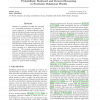Free Online Productivity Tools
i2Speak
i2Symbol
i2OCR
iTex2Img
iWeb2Print
iWeb2Shot
i2Type
iPdf2Split
iPdf2Merge
i2Bopomofo
i2Arabic
i2Style
i2Image
i2PDF
iLatex2Rtf
Sci2ools
ICML
2010
IEEE
2010
IEEE
Probabilistic Backward and Forward Reasoning in Stochastic Relational Worlds
Inference in graphical models has emerged as a promising technique for planning. A recent approach to decision-theoretic planning in relational domains uses forward inference in dynamic Bayesian networks compiled from learned probabilistic relational rules. Inspired by work in non-relational domains with small state spaces, we derive a backpropagation method for such nets in relational domains starting from a goal state mixture distribution. We combine this with forward reasoning in a bidirectional two-filter approach. We perform experiments in a complex 3D simulated desktop environment with an articulated manipulator and realistic physics. Empirical results show that bidirectional probabilistic reasoning can lead to more efficient and accurate planning in comparison to pure forward reasoning.
Bidirectional Probabilistic Reasoning | Forward Reasoning | ICML 2010 | Machine Learning | Relational Domains |
| Added | 09 Nov 2010 |
| Updated | 09 Nov 2010 |
| Type | Conference |
| Year | 2010 |
| Where | ICML |
| Authors | Tobias Lang, Marc Toussaint |
Comments (0)

